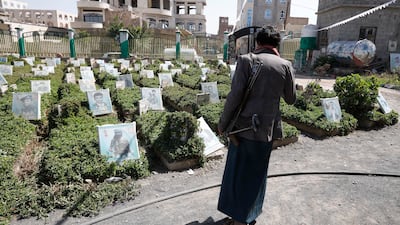Tim Lenderking's appointment as US envoy to Yemen in February was an early sign of the importance the Biden administration places on ending the country's seven-year war and the crisis of governance there. He is the first American envoy since the country descended into conflict in 2014 after the Houthi coup in Sanaa. A senior diplomat and former deputy assistant secretary for Arabian Gulf Affairs, Mr Lenderking was described by former Pentagon official and colleague Andrew Exum as “a real mensch, and someone who knows the region as well as anyone in the US government”.
On Monday, he visited Aden, the seat of Yemen’s internationally recognised administration, for the first time to meet the country's Prime Minister and other senior officials. He called for "all Yemenis to come together to end this war and enact bold reforms to revive the economy, counter corruption and alleviate suffering”.
There is no doubt that Mr Lenderking has the experience to undertake this difficult post, and the right priorities to make as much a success of it as he can. But even the most gifted international diplomats have struggled to bring about peace.
The conflict has become one of the Middle East's most intractable issues, and only gets more complicated as new strands of the humanitarian crisis emerge. This is not for want of possible solutions; the US has already backed a Saudi-proposed ceasefire deal.
What stops progress is the complexity of the situation on the ground, and the violence of those who prolong it. Iran-backed Houthi rebels continue to mount a brutal, pitched campaign to capture the oil-rich city of Marib, even as the World Food Programme says that 16 million people (more than half the country's population) are "marching towards starvation" as winter approaches. It is estimated that one child in Yemen dies every 10 minutes from preventable causes.
This sustained violence from a group ideologically committed to war flies in the face of the diplomacy the international community and responsible Yemeni parties are trying to inject into the country. Making the situation even harder is the fact that, due to safety concerns, there are simply not enough foreign representatives and international organisations on the ground. Tellingly, the only embassy still operational in Sanaa is that of Iran.
This vacuum has fuelled a moral Wild West in which well-funded Houthi fighters and criminals act unopposed in prolonging the suffering of Yemenis and implementing a brutal ideology. A Houthi-run court, for example, has just sentenced Yemeni model Entisar Al Hammadi to five years in prison, on what are widely believed to be baseless charges.
Given this context, even the best work of the international community has been unable to solve the crisis. But by offering help and demanding accountability in equal measure, a humanitarian response might ease conditions that make extreme ideologies, such as the Houthis', seem the only option for many of its supporters.
Such a worldview does not have to be the only way out for all of the group's foot soldiers; it is still the creation of a self-serving leadership. Its transmission to the rank-and-file might be easier in such a dire humanitarian situation, but Yemenis are tired of war and isolation.
Mr Lenderking and the diplomats working to solve the crisis should use this knowledge to create the dynamics that can bring Yemenis together to agree on a better future.











